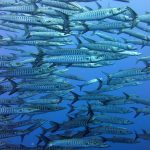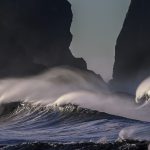 May 13, 2019 9:59 am
Published by Climate Extremes
May 13, 2019 9:59 am
Published by Climate Extremes
Project: To investigate rapid shallow-water/coastal marine cooling events characterised by sudden transitions from marine heatwave to marine cold spell conditions, and the risk likelihood to vulnerable fish species.
 May 8, 2019 1:23 pm
Published by Climate Extremes
May 8, 2019 1:23 pm
Published by Climate Extremes
CLEX researchers present a new method to examine seasonal variations in the global wave climate that accounts for the full directional wave spectra and includes wave systems with different frequencies and directions separately.
 March 18, 2019 3:12 pm
Published by Climate Extremes
March 18, 2019 3:12 pm
Published by Climate Extremes
Two workshops, the Sea Ice Modelling Workshop and Centre of Excellence for Climate Extremes “Southern Annular Mode (SAM) Cluster” workshop were held together at the Institute for Marine and Antarctic Studies in Hobart from February 19-21.
October 16, 2018 11:03 am
Published by Climate Extremes
As human pressures on natural systems escalate, understanding and predicting the distribution biodiversity, now and into the future, has become increasingly important for managing marine systems. Biological data are usually sparse and patchy, yet managers need comprehensive information at broad spatial scales to make important decisions such as prioritising areas for conservation (e.g. Marine Protected Areas), managing the impacts of activities such as fishing and deep-sea mining, and developing response plans to climate change. Our three speakers will discuss the... View Article
 August 4, 2018 4:16 am
Published by Climate Extremes
August 4, 2018 4:16 am
Published by Climate Extremes
The Climate Variability and Teleconnections Research Program has formed into three separate clusters – SAM, Tropical Variability and Oceans.
 April 9, 2018 6:30 am
Published by Climate Extremes
April 9, 2018 6:30 am
Published by Climate Extremes
An international study in Nature Communications co-authored by researchers from the ARC Centre of Excellence for Climate Extremes (CLEX) and the Institute of Marine and Antarctic Studies (IMAS) reveals globally marine heatwaves have increased over the past century in number, length and intensity as a direct result of warming oceans.





